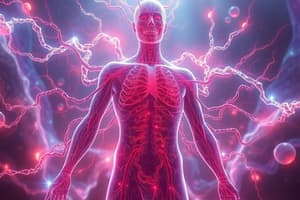Podcast
Questions and Answers
What is the primary function of the general defence system?
What is the primary function of the general defence system?
- To enable the body to produce antibodies against antigens
- To enhance the activity of lymphocytes in response to infections
- To provide long-lasting immunity against specific pathogens
- To act as a non-specific first line of defence against foreign molecules (correct)
Which cells are involved in the specific defence system?
Which cells are involved in the specific defence system?
- Neutrophils and macrophages
- Mast cells and basophils
- Lymphocytes and monocytes (correct)
- Platelets and red blood cells
What is a characteristic feature of active immunity?
What is a characteristic feature of active immunity?
- Results from direct injection of antibodies
- Provides immediate protection without prior exposure
- Activates the body to produce its own antibodies (correct)
- Involves antibodies passed from mother to child
What describes natural passive immunity?
What describes natural passive immunity?
How does artificial active immunity differ from natural immunity?
How does artificial active immunity differ from natural immunity?
What is the role of B-lymphocytes in the immune response?
What is the role of B-lymphocytes in the immune response?
Which of the following statements is true regarding T-lymphocytes?
Which of the following statements is true regarding T-lymphocytes?
What is the main function of killer T cells?
What is the main function of killer T cells?
Which of the following best describes the composition of the specific defence system?
Which of the following best describes the composition of the specific defence system?
What describes a vaccine in the context of immunity?
What describes a vaccine in the context of immunity?
Flashcards are hidden until you start studying
Study Notes
Immunity
- Immunity is the ability of an organism to fight infections through various mechanisms.
General Defense System
- Functions as a non-specific first line of defense against foreign molecules.
- Composed of:
- Skin
- Enzymes
- Clotting factors (platelets)
- Mucous
- Cilia
- Acid
Specific Defense System
- Acts as a second line of defense, targeting specific antigens.
- Involves an antigen-antibody response with specialized white blood cells.
- Composed of:
- Lymphocytes
- Monocytes
- Interferons
- Inflammation
Active Immunity
- Occurs when the body produces its own antibodies.
- Provides long-term immunity.
Passive Immunity
- Offers short-term immunity as it involves the transfer of antibodies rather than production by the body.
Natural Passive Immunity
- Antibodies transferred from mother to child, occurring during pregnancy or breastfeeding.
Artificial Active Immunity
- Involves injecting or ingesting small doses of antigens, prompting the body to produce antibodies.
- Example: Injection of a vaccine.
Vaccine
- An injection of a dead or deactivated microbe designed to stimulate an antibody response, resulting in long-term immunity.
B-Lymphocytes vs. T-Lymphocytes
- B-Lymphocytes:
- Mature in the bone marrow.
- Produce antibodies.
- T-Lymphocytes:
- Mature in the thymus gland.
- Do not produce antibodies.
Killer T Cell Function
- (Pending completion of information regarding the function of the killer T cell).
Studying That Suits You
Use AI to generate personalized quizzes and flashcards to suit your learning preferences.




